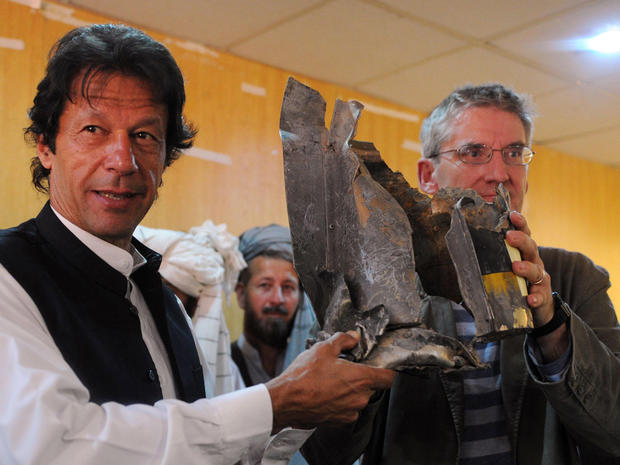Americans head to Pakistan to protest drone strikes where they happen
LONDON Anti-war protesters often voice their opinions in front of the White House, or some other place far away from the dangers of the war they're protesting. But on Wednesday, more than two dozen Americans were flying to Pakistan to demand an end to the U.S. government's most taboo weapon in the war against Islamic extremist groups: drone strikes.
The strikes officially do not exist. The U.S. government has never confirmed that the CIA is behind them, though it is widely accepted as fact and has never been disputed. When one of the strikes kills a high-value terrorism target, the death is often confirmed by American officials - always off the record and never by name.
What is not widely reported are the deaths of people who were never meant to be on the receiving end of a U.S. hellfire missile.
That is what Clive Stafford Smith, founder of Reprieve, and his counterpart at the U.S. activist group Code Pink, Medea Benjamin, hope to highlight by traveling to what is arguably one of the more dangerous places in the world for Americans.
- U.S. judges question CIA's drone secrecy
- Apple rejects app for tracking U.S. drone strikes
- Pakistan official slams drones ahead of CIA talks
Reprieve and Code Pink obtained Pakistani visas for about 36 people, most of them from the U.S., to travel to the Asian nation which borders Afghanistan. They will join up with like-minded Pakistanis organized by opposition politician Imran Khan in Islamabad, and then this weekend, assuming they get the expected permission from the government, they will travel to South Waziristan.
CBSNews.com will report on the protest from South Waziristan on Monday.
Waziristan, both North and South, are situated in the remote northwest region of Pakistan right along the Afghan border. It is Taliban country. The militants enjoy a huge amount of support there - it is one of the areas referred to by U.S. commanders in Afghanistan who talk about Taliban attackers seeking refuge in "safe havens" across the border.
The protesters plan to arrive in South Waziristan in a vehicle convoy on Sunday, with pictures of children allegedly killed by the drone strikes plastered on the tops of their cars and rooftops in the villages along the route.
"We've done everything we can to make sure people are safe," Stafford Smith told CBSNews.com the day before his flight to Pakistan. "But really, the people's safety I worry about most are the children who are being killed in Waziristan right now, because they're clearly not safe and whether they are going to be killed tomorrow or not, we are traumatizing them every day with these drones flying around and around overhead."
According to Reprieve, 176 Pakistani children have been killed in drone strikes since the program began eight years ago.
The other chief argument put forward by the anti-drone protesters is that the strikes are short-sighted; worsening tomorrow's problems with the intended solution to today's.
"It's counterproductive," Benjamin, of Code Pink, told CBSNews.com, saying the strikes were, "creating enemies faster than we can kill them."
She called the drone program, "the best recruiting tool that the Taliban and al Qaeda have."
"If you fly weapons over people's heads 24 hours a day, what do you think happens to them? Children don't go to school anymore because they're afraid they're going to be bombed. They can't sleep at night," Stafford Smith said, citing recent research papers published by Stanford and New York University and another by a Columbia. The research found a dramatic rise in the prescription of anti-anxiety drugs in North and South Waziristan, home to about 800,000 people.
The strikes, said Stafford Smith, "are terrorizing people that are patently innocent - whether they get people who are guilty or not. People who are innocent are being traumatized."
Al Qaeda's foothold in the region has been all but dislodged by the strikes, however. Major success stories include the killing of the terror network's number-two commander this summer. Abu Yahya al-Libi's death in a drone strike in Pakistan was confirmed to CBS News by a senior U.S. official, speaking on condition of anonymity.
The intended and unintended targets of the strikes aside, there have been serious questions raised as to their legality.
The closest the Obama administration has come to expressing a stance on that topic came from State Department legal adviser Harold Hongju Koh, who told the American Society of International Law last year it was, "the considered view of this administration - and it has certainly been my experience during my time as legal adviser - that U.S. targeting practices, including lethal operations conducted with the use of unmanned aerial vehicles, comply with all applicable law, including the laws of war."
Stafford Smith - a renowned international lawyer, in addition to being an activist - disagrees.
"What the United States is doing in Waziristan is patently illegal," he told CBS News. "We're committing international war crimes every day, because we're not at war with Pakistan. Let's be honest about it. The reason the CIA is being so secretive about it is they know what they're doing is illegal, despite the pretext otherwise."
